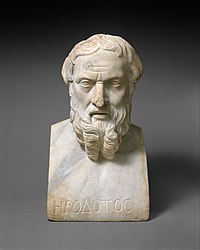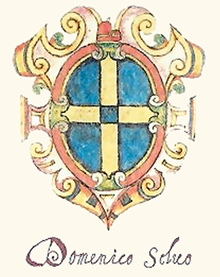Portal:History
The History Portal

Herodotus (c. 484 BC – c. 425 BC) is often
considered the "father of history"
History (derived from Ancient Greek ἱστορία (historía) 'inquiry; knowledge acquired by investigation') is the systematic study and documentation of the human past. History is an academic discipline which uses a narrative to describe, examine, question, and analyse past events, and investigate their patterns of cause and effect. Historians debate which narrative best explains an event, as well as the significance of different causes and effects. Historians debate the nature of history as an end in itself, and its usefulness in giving perspective on the problems of the present.
The period of events before the invention of writing systems is considered prehistory. "History" is an umbrella term comprising past events as well as the memory, discovery, collection, organization, presentation, and interpretation of these events. Historians seek knowledge of the past using historical sources such as written documents, oral accounts or traditional oral histories, art and material artefacts, and ecological markers.
Stories common to a particular culture, but not supported by external sources (such as the tales surrounding King Arthur), are usually classified as cultural heritage or legends. History differs from myth in that it is supported by verifiable evidence. However, ancient cultural influences have helped create variant interpretations of the nature of history, which have evolved over the centuries and continue to change today. The modern study of history is wide-ranging, and includes the study of specific regions and certain topical or thematic elements of historical investigation. History is taught as a part of primary and secondary education, and the academic study of history is a major discipline in universities.
Herodotus, a 5th-century BCE Greek historian, is often considered the "father of history", as one of the first historians in the Western tradition, though he has been criticized as the "father of lies". Along with his contemporary Thucydides, he helped form the foundations for the modern study of past events and societies. Their works continue to be read today, and the gap between the culture-focused Herodotus and the military-focused Thucydides remains a point of contention or approach in modern historical writing. In East Asia a state chronicle, the Spring and Autumn Annals, was reputed to date from as early as 722 BCE, though only 2nd-century BCE texts have survived. The title "father of history" has also been attributed, in their respective societies, to Sima Qian, Ibn Khaldun, and Kenneth Dike. (Full article...)
Featured picture
Did you know (auto generated)

- ... that Yesenia Yarhui, the youngest parliamentarian in Bolivian history, was sworn into the Chamber of Deputies at just 19 years old?
- ... that a historian lamented the lack of English-language translations for the work of Aracy Amaral despite it being "a vital reference for the study of art history in Brazil"?
- ... that the 1925 Tri-State tornado was the deadliest in United States history?
- ... that for 19 years Tonya Burns had the only retired jersey number in Iowa State women's basketball history?
- ... that the 1931 Valentine earthquake was the strongest earthquake in recorded history to hit Texas?
- ... that the Otoskwin–Attawapiskat River Provincial Park, protecting the Otoskwin and Attawapiskat Rivers in Ontario, Canada, has archaeological and historical sites dating from 3000 BC to the 1800s?
Isabeau of Bavaria (or Isabelle; also Elisabeth of Bavaria-Ingolstadt; 28 April 1370 – 24 September 1435) was Queen of France as the wife of King Charles VI from 1385 to 1422. She was born into the House of Wittelsbach as the only daughter of Duke Stephen III of Bavaria-Ingolstadt and Taddea Visconti of Milan. At age 15 or 16, Isabella was sent to France to marry the young Charles VI; the couple wed three days after their first meeting. Isabella was honored in 1389 with a lavish coronation ceremony and entry into Paris.
In 1392, Charles suffered the first attack of what was to become a lifelong and progressive mental illness, resulting in periodic withdrawal from government. The episodes occurred with increasing frequency, leaving a court both divided by political factions and steeped in social extravagances. A 1393 masque for one of Isabeau's ladies-in-waiting—an event later known as Bal des Ardents—ended in disaster with Charles almost burning to death. Although the King demanded Isabeau's removal from his presence during his illness, he consistently allowed her to act on his behalf. In this way she became regent to the Dauphin of France (heir apparent), and sat on the regency council, allowing her far more power than was usual for a medieval queen consort. (Full article...)
On this day
January 26: Australia Day (1788); Republic Day in India (1950)
- 661 – Ali, the fourth Rashidun caliph, was assassinated (depicted) by Ibn Muljim, leading to the end of the caliphate.
- 1788 – Captain Arthur Phillip and the British First Fleet landed at Sydney Cove on the shore of Port Jackson, establishing the first permanent European settlement in Australia.
- 1885 – Mahdist War: The siege of Khartoum ended as Mahdist forces defeated the Egyptian garrison and captured the city.
- 1934 – Hurtig & Seamon's New Burlesque Theater in New York City reopened as the Apollo Theater, becoming one of the nation's premier venues for African-American performers.
- 2015 – A jet fighter crashed at Los Llanos Air Base in Albacete, Spain, killing 11 people and injuring 21 others.
- Lady Zhen (b. 183)
- Manuel do Cenáculo (d. 1814)
- Joan Leslie (b. 1925)
- Kobe Bryant (d. 2020)
Selected quote
Even death is not to be feared by one who has lived wisely.
— Gautama Buddha, founder of Buddhism
Related portals
More Did you know...
- ... that the underground Fortress of Mimoyecques (pictured) was built by Nazi Germany to bombard London with 10 shells a minute using the V-3 supergun?
- ... that Howard P. Perry was the first African American recruit in the United States Marine Corps?
- ... that the Chester city walls form the most complete circuit of Roman and medieval defensive town walls in Britain?
- ... that China's first female director was adopted by the first Premier of the People's Republic of China?
- ... that the Medieval Merchant's House in Southampton was being used as a brothel when bomb damage during the Blitz revealed the building's important medieval architecture?
- ... that the Sumerian "river of paradise", the Hubur, derived partly from real geography before becoming a demonic fantasy?
- ... that Bill Foley's photograph "The Last Smile" shows Anwar Sadat only moments before his assassination?
- ... that the 1911 Sarez earthquake triggered a huge landslide, forming the tallest dam in the world?
Topics
Categories

History • By period • By region • By topic • By ethnic group • Historiography • Archaeology • Books • Maps • Images • Magazines • Organizations • Fictional • Museums • Pseudohistory • Stubs • Timelines • Chronology • People • Wikipedia historians
WikiProjects
![]() WikiProject History •
Ancient Near East • Australian History • Classical Greece and Rome • Dacia • Former countries • History of Canada • Chinese history • European history • Heraldry and vexillology • Indian history • Jewish history • Medieval Scotland • Mesoamerica • Military history • Middle Ages • History of Science
WikiProject History •
Ancient Near East • Australian History • Classical Greece and Rome • Dacia • Former countries • History of Canada • Chinese history • European history • Heraldry and vexillology • Indian history • Jewish history • Medieval Scotland • Mesoamerica • Military history • Middle Ages • History of Science
WikiProject Time • Days of the Year • Years
WikiProject Biography • Composers • Political figures • Saints • United States Presidents
Things you can do
 |
Here are some tasks awaiting attention:
|
Associated Wikimedia
The following Wikimedia Foundation sister projects provide more on this subject:
-
Commons
Free media repository -
Wikibooks
Free textbooks and manuals -
Wikidata
Free knowledge base -
Wikinews
Free-content news -
Wikiquote
Collection of quotations -
Wikisource
Free-content library -
Wikiversity
Free learning tools -
Wiktionary
Dictionary and thesaurus
























































